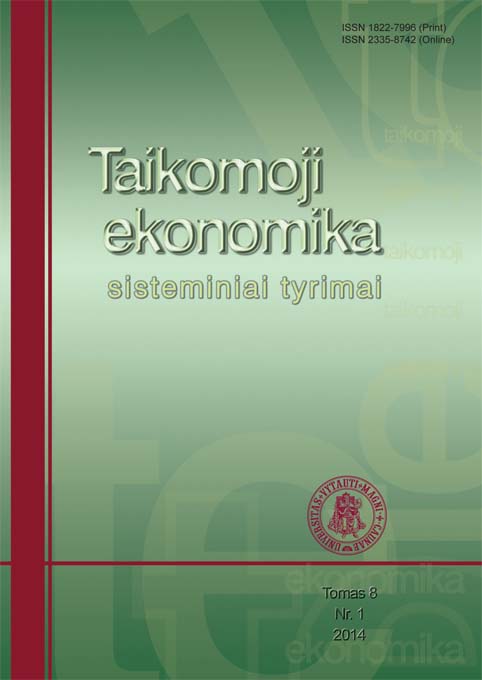Valstybės išlaidų struktūros ir politinės ideologijos sąsajų įtaka šalies ekonomikai
Public expenditure’s structure’s and political ideology’s interface impact on the country’s economy
Author(s): Gerda Žigienė, Sandra SlavickaitėSubject(s): Economy
Published by: Vytauto Didžiojo Universitetas
Keywords: Ekonomikos augimas; Politinė ideologija; Valstybės išlaidos; Economic growth; Political ideology; Government spending
Summary/Abstract: Straipsnyje nagrinėjama valstybės išlaidų įtaka ekonomikai, analizuojama kaip valstybės išlaidų struktūra veikia ekonomikos augimą, atskleidžiama vyraujančių politinių ideologijų įtaka valstybės išlaidų struktūrai. The article discusses the influence of public expenditure on the economy, it analyses how the structure of public expenditure affects the growth of the economy and reveals the influence of prevailing political ideologies on public expenditure. Public expenditure, depending on its influence on the economy, is classified into productive (these are expenditure on economy, education, health, defence, environment protection, public order), and unproductive (such as social security, general public services, recreation, culture and religion). The positive balance between the two sources of expenditure and the higher the productive part in the overall expenditure of a country’s economy the better the chances of successful managing the country’s spending and providing economic profit and boosting economic growth. Political parties in the Parliament each allocate expenditure priorities differently according to their ideology. Having that in mind it is stressed that the ruling party and its ideology have an impact on the structure of the country’s expenditure and this in result may have a positive or negative impact on the economy. All political ideologies are usually combined using a linear political spectrum. The linear political spectrum conveys ideology between left-wing and right-wing politicians. Traditionally the left-wing parties support social security expenditure as well as expenditure on health, environment protection, and education. On the opposite the right-wing leaders rise expenditure on national defence and military. The country’s expenditure of left-wing governments usually grows much faster than right-wing ones and it has been observed all over the world through empirical studies that expenditure is generally higher in left-wing governments. The political spectrum in Lithuania has not been wide since the restoration of Independence: 6 times the government was right-wing and conservative, twice it was liberal, and 9 times Lithuania was ruled by left-wing and social democrats. Left-wing parties in Lithuania usually opt for liberty and freedom rights, social justice, well-developed social security and support, and right-wing parties prefer democratic changes in society, traditional family model, social security means reasonable wages and tax system improvement but not social security in various forms. On the basis of the analysis of the influence of ruling parties political ideologies on the structure of expenditure, it has been observed that political ideologies in Lithuania are intertwined – the right-wing parties have spent more on social security, environment protection, general public services, and the leftwing parties have been much more conservative with these spending but more lavish on national defence.
Journal: Taikomoji ekonomika: sisteminiai tyrimai
- Issue Year: 8/2014
- Issue No: 1
- Page Range: 13-29
- Page Count: 17
- Language: Lithuanian

